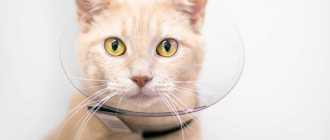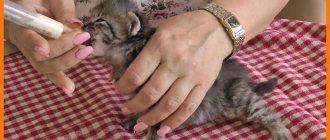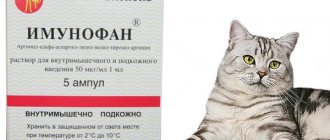One of the most common diseases found in all domestic animals is helminthiasis, that is, infection with worms. The waste products of these parasites poison the body, disrupting the functioning of internal organs. To avoid complications, every owner should be aware of how and what is the best way to deworm a cat for treatment or prevention.
Where do worms come from in a kitten?
At what age can kittens be treated for fleas?
There is an opinion that if the cat is domestic, that is, it does not leave the boundaries of the apartment and does not come into contact with street cats and dogs, then it cannot have worms. It's not like that at all. There are many ways a pet can become infected:
- worms can enter the kitten’s body from the cat through the placenta;
- parasites can be transmitted to a small kitten through milk;
- helminth eggs can enter the animal’s body with food;
- fleas and some insects are carriers of certain types of eggs; a kitten can become infected with them by eating a carrier of worms.
How often should a domestic cat be wormed?
Some cat lovers generally believe that domestic cats do not need to be dewormed in principle. They motivate this by the fact that the animal has nowhere to become infected. However, this is a common misconception. Worm eggs can get on the cat almost with dust. So, they can be brought into living quarters from the street on the sole of a shoe. Another source of infection can be food. This is especially true for cats whose diet includes natural products.
In general, you need to worm your domestic cat. But how often depends on the situation.
Symptoms of worm infection
To what age do cats grow - regular and purebred?
Symptoms of the presence of worms in a cat’s body can be expressed to varying degrees. It all depends on the stage of the disease and the type of parasite. In the early stages, symptoms of infection may be almost invisible or not appear at all.
Types of worms parasitizing the cat's body
Most common symptoms:
- disruption of the gastrointestinal tract (digestive problems, vomiting, diarrhea or constipation, increased or decreased appetite);
- periodic cough;
- yellowish color of mucous membranes;
- increased liver size;
- anemia;
- problems with the coat;
- itching of the anus;
- purulent discharge from the eyes and nose of the animal;
- blood in the discharge;
- intoxication;
- paralysis in the final stages;
- bloating;
- slow development in young kittens.
Some symptoms of infection may be similar to those of other diseases, viral or infectious.
Important! In some cases, deworming can lead to a deterioration in the condition of the sick animal and even death!
If there are some signs of the presence of worms, you need to contact your veterinarian. To accurately determine the presence of parasites, the doctor will prescribe laboratory tests, the results of which can make an accurate diagnosis.
Visible and hidden results of treatment
The therapeutic effect is most often achieved with a single use of the drug - this is more than 90% of cases. After treating the kitten, we constantly look into the tray: are there any worms? It is not always possible to see them in the feces; if the kitten has been infected with a small number of helminths, then they are digested in the intestines and are not visible in the tray.
There is a common belief that the more worms found in the feces, the more effective the treatment, but a similar picture is observed precisely when the animal is simply infested with parasites, and repeated treatment is inevitable. If the infection is severe, the helminths may be released through vomiting.
© shutterstock
You can find out for sure about the “expulsion” of worms from a cat’s body only by having its feces analyzed. But visually, in case of successful treatment, there will be a noticeable change in the baby’s appearance, his playfulness will increase, his appetite and stool will improve.
In case of successful treatment, for complete recovery and protection from relapse, you need to take some preventive measures.
Why do worms need to be removed?
How to bathe a kitten: with what frequency and at what age
As you know, due to helminthiasis, not only the intestines suffer, but also organs such as the liver, lungs, heart, and gall bladder. Moreover, worms release toxins and deplete the body. They, feeding on blood and lymph, rob the body of all useful substances, without which the animal’s body cannot function as usual. Over time, the worms die and, decomposing, cause intoxication and allergic reactions in the animal's body.
Deterioration of the cat’s condition in the presence of worms, even after worming
Poisoning and complications after using anthelmintic drugs - what to do?
Symptoms of poisoning from kittens are similar to human symptoms: vomiting, diarrhea, weakness, drowsiness, difficulty breathing, fever, etc.
Most often, the kitten just needs to be given a little rest and provided with plenty of water. You can also give some medicine to cleanse the stomach.
If the poisoning is severe enough and there are many symptoms, you should immediately contact a veterinary clinic. There the kitten will be injected with a special saline solution and the intestines will be washed. Most likely, a course of vitamin medications will subsequently be prescribed for recovery.
How to properly remove worms from Sphynx kittens
Due to improper treatment, the animal can be poisoned or even die. To prevent this from happening, if you suspect the presence of parasites in your pet, you need to act as follows:
- To diagnose your pet, you need to show it to a veterinarian;
- prescribed medications are bought only at the pharmacy, because counterfeits are often sold at the market and in stalls, which not only will not help the cat, but will also harm;
- There are medications for worms for small kittens and for adults. A pet can die from an overdose;
- It is better for small kittens to take the drugs in suspension.
Attention! Before giving your cat any anti-worm medication, you need to carefully read the instructions.
Treating a cat with a suspension
Application of the suspension
Using a suspension is the easiest way to treat a kitten for worms. The purchased suspension must be shaken and the required dosage drawn up using a syringe. The syrup can be poured into the kitten’s cheek or mixed with food.
Folk remedies
If you find worms in your pet, you can use some folk remedies:
- feed the animal with chamomile;
- feed the cat on an empty stomach with onion tincture (cut the onion into pieces and pour warm water);
- give your pet a tincture of tansy flowers (pour boiling water over a tablespoon of flowers, leave for an hour, filter and give to the cat before eating);
- carrot juice enemas (introduce about 20 ml of juice into the anus);
- adding chopped garlic to food.
Folk remedies, unlike pharmaceutical drugs, must be given for a long time to achieve the desired effect. But they have their advantages. All tinctures used for treatment are non-toxic. Therefore, treatment with folk remedies is recommended for pregnant and lactating cats, as well as weakened kittens.
Deworming with vaccination
You can also deworm your pet using injections. This is a very effective treatment if done correctly. It is important to choose the right drug and calculate the correct dosage. When administering the injection, you need to hold the animal correctly so as not to cause harm. If this is the first injection, it is better to do it at a veterinary clinic.
How to give a kitten an anti-worm tablet
Ways to give a cat a pill:
- you need to place the cat on your lap, with its back to you, open its mouth and put a pill in it, then close its mouth and stroke the pet’s throat;
- grind the tablet well and pour the powder into water, put it into a syringe and pour it into the cat’s cheek;
- The crushed tablet can also be added to your pet's food.
Note! Particularly violent cats should be wrapped in a towel and immobilized, and then given a pill.
Scottish cat: how to worm a baby before vaccination
It is known that every year pets, including cats, need vaccination. Veterinarians strongly recommend treating the animal for worms before carrying out this procedure. This is done because the presence of parasites in the animal’s body can reduce the effectiveness of the vaccination. Therefore, ten days before vaccination it is necessary to carry out deworming.
Rules for deworming:
- the procedure cannot be performed on a sick animal;
- a drug suitable for a particular pet is selected, this requires consultation with a veterinarian;
- dosage must be observed;
- the drug is given to the cat in the morning, on an empty stomach;
- if the cat has fleas or other parasites, then 3 days before deworming, treatment is carried out against them.
Features of the event
Deworming is carried out to prevent in cats, but primarily in humans, specific diseases caused by various types of helminths.
One of the most dangerous diseases for humans is caused by flatworms - echinococcosis. Cats that eat mice become infected. Helminthiasis is especially common in Siberia. For prophylaxis, the drugs Praziquantel and Epsiprantel are used. They are used all over the world as a 100% effective treatment against tapeworms. Any other anthelmintics containing praziquantel are suitable (dose of at least 5 mg/kg). Animals living in the outbreak area and allowed to go outside are dewormed every month or every 45 days (8 times a year). These drugs are designed to be taken so frequently and do not harm the liver. On the European territory of the country, animals from the group “traveling to the countryside and out of town” need to be treated once a quarter.
Praziquantel works against other flatworms. Therefore, prevention of echinococcosis also involves treatment against other types of parasites. The only exception is the cucumber tapeworm, which causes dipylidia. Its carriers are fleas and lice eaters. Therefore, coat care and antiparasitic treatment against insects are also necessary. They use products based on fipronil (Frontline, Fiprist Spot On) and imidacloprid (Advantage).
The following are not suitable for the prevention of tapeworms: Stronghold, Advocate, Inspector, drugs based on ivermectin - Ivomec, Ivermec, Otodectin, etc.
The second no less dangerous disease transmitted from cats to humans is toxocariasis. The disease is caused by roundworms toxacara. An animal becomes infected through the external environment. Another route of infection is from mother to kittens through milk. In kittens, prophylaxis begins at 6 weeks of age. For deworming at home, use the drugs Milbemax, Milbe Pet, and others with the main active ingredient - milbemycym oxime. As well as medications based on fenbendazole, for example, Febtal, which is approved for pregnant and lactating women. All antiparasitic drugs act on other types of roundworms.
Is it possible to get worms from a kitten?
Infection from a cat with worms is quite possible. The whole reason is that some types of parasites can live both in the animal body and in the human body. Children are at particular risk of infection. There are several ways you can get parasites from your pet. First of all, through the mouth, since the cat licks itself and spreads worms over the entire surface of the fur, which then end up on human hands, furniture, etc. Infection also occurs from cat toys and litter trays.
Infection of a person with worms through close contact with a cat
The most effective anthelmintic drugs
Regardless of what breed the pet is: British, Fold, Scots, deworming medications are the same for all breeds. All of them are divided into two types:
- broad-spectrum drugs that can fight several types of parasites;
- drugs aimed at a specific type of worms.
Almost all drugs are available in the form of tablets, suspensions, and drops. Popular drugs depending on the form of release:
- in the form of tablets - Drontal, Milprozone, Cestal, Protep, Kanikvantel, etc.;
- in suspension – Prazicide, Dirofen; Prazitel et al.;
- in drops – Delmintal, Inspector, Profandor, Lawyer Dironet, etc.
Only a veterinarian can determine what medicine a kitten needs after a laboratory report. You can choose the release form yourself.
Anthelmintic for cats – which is better?
The debate on the topic of the best anthelmintic for cats does not stop for a minute. The subject of discussion is the effectiveness of this or that remedy, the likelihood of counterfeiting the drug, and the high price of anthelmintic for cats.
All these, of course, are significant factors, but the essence of the problem lies in the degree of harm to the animal’s body. After all, every cat owner wants an effective and safe product for their pet. Let's look at the most popular anthelmintic drugs on the veterinary market:
- Milbemax - reviews about the product are the most positive. The main disadvantage is the narrow spectrum. This is an excellent anthelmintic for domestic cats, but for those who like to walk, it is better to choose something stronger. It should also not be given to kittens under the age of 1.5 months.
- Prazitel, Prazicide, Drontal - they are all popular, but rather weak drugs with a narrow spectrum of action. They may not cure a cat picked up from the street. But this is not the main disadvantage. The lack of drugs lies in their popularity. They are often counterfeited, and counterfeit products are often low quality and toxic, which can kill a cat. Although Drontal is classified as an anthelmintic for pregnant cats, and this is a clear plus.
- Dirofen. The tablets gained popularity due to such qualities as versatility and good effect. Although kittens under 1.5 months are not given the drug.
- Profender. As in the previous case, it is not suitable for small cats and cats. Type of drug: drops on the withers. The effect of use is good and quite gentle. The amount of product to be applied is calculated taking into account the weight of the pet.
- Vacation. One of the most gentle medicines. Thanks to this property, it is prescribed even to small, three-week-old kittens.
When purchasing any of the above drugs, be careful. After all, the market for counterfeit anthelmintics is developing successfully. Ask sellers for product certificates, and do not hesitate to study the product packaging before purchasing. Remember, the price for a high-quality anthelmintic for cats cannot be too low. Also, do not buy drugs from unreliable sources, such as free bulletin boards or underground passages.
You can now view the current price for anthelmintic drugs and buy them right here:
Prevention of helminthic infestation in a kitten
In order not to miss the appearance of worms in a kitten and not to progress its condition to severe stages of the disease, some preventive measures should be taken. Deworming for preventive purposes is carried out once every three months. If the cat has a severe degree of infestation, the treatment is repeated after ten days.
Appointment with a veterinarian
Measures to prevent the appearance of worms in cats:
- periodically, regardless of whether the kitten has worms, it should be treated with antiparasitic agents;
- since worms can enter the cat’s body along with food, you should feed it only fresh, well-cooked fish;
- Do not allow your pet to come into contact with sick animals;
- bowls, toys, tray and other items should be disinfected monthly.
The presence of worms in a pet can harm not only the animal itself, but also all family members. Timely, proper treatment can save your pet's life.
How to use Prazitel
It's time to give your kitten an anthelmintic. To quickly and painlessly get rid of worms in a kitten, it is most convenient to give him a suspension medicine at the rate of 1 ml per 1 kg of the baby’s weight. This is a very convenient form of the drug; the dosage is determined and given to the kitten using a special syringe included in the package. In terms of strength, the suspension is absolutely similar to tablets, which must be used in the following proportions: 1 tablet per 1 kg of body weight.
Pre-crush the tablet, dilute it in a small amount of water and pour it into the kitten’s mouth. When choosing a convenient medicine, you need to take into account the individual characteristics of your pet.
The drug is used once; in case of severe infection, repeat the procedure after 10 days. Sometimes veterinarians, when prescribing treatment, believe that the kitten should be wormed twice with a break of two weeks.











